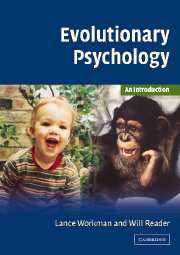Book contents
- Frontmatter
- Contents
- List of figures
- List of tables
- 1 Introduction to evolutionary psychology
- 2 Mechanisms of evolutionary change
- 3 Sexual selection
- 4 The evolution of human mate choice
- 5 Cognitive development and the innateness issue
- 6 Social development
- 7 The evolutionary psychology of social behaviour – kin relationships and conflict
- 8 The evolutionary psychology of social behaviour – reciprocity and group behaviour
- 9 Evolution, thought and cognition
- 10 The evolution of language
- 11 The evolution of emotion
- 12 Evolutionary psychopathology and Darwinian medicine
- 13 Evolutionary psychology and culture
- Glossary
- References
- Index
- References
9 - Evolution, thought and cognition
- Frontmatter
- Contents
- List of figures
- List of tables
- 1 Introduction to evolutionary psychology
- 2 Mechanisms of evolutionary change
- 3 Sexual selection
- 4 The evolution of human mate choice
- 5 Cognitive development and the innateness issue
- 6 Social development
- 7 The evolutionary psychology of social behaviour – kin relationships and conflict
- 8 The evolutionary psychology of social behaviour – reciprocity and group behaviour
- 9 Evolution, thought and cognition
- 10 The evolution of language
- 11 The evolution of emotion
- 12 Evolutionary psychopathology and Darwinian medicine
- 13 Evolutionary psychology and culture
- Glossary
- References
- Index
- References
Summary
Key concepts computational theory of mind, substrate neutrality, levels of explanation, reverse engineering, episodic and semantic memory, inceptive and derived memories, prototypes, heuristics, the gambler's fallacy, conditional reasoning, foraging theory
The ability to respond to and act upon the environment was a big step in evolution, requiring sophisticated mechanisms of perception, monitoring and decision making. In the twentieth century, a new form of psychology was developed – cognitive psychology – which described these control processes in terms of their underlying computations. Traditional theories of cognition have tended to emphasise proximate causes, explaining behaviour in terms of the cognitive processes that underlie it rather than ultimate ones. Evolutionary approaches to cognition attempt to explain behaviour at the ultimate level in terms of behaviours that might have been adaptive in the Environment of Evolutionary Adaptation (EEA). In doing this they seek the adaptive significance of certain behaviours and ask what specific problems the cognitive system was designed to solve. Cognition is therefore seen as adaptive and apparent maladaptive behaviour is either the result of differences between the current world and the EEA, or necessary trade offs in the evolution of mind. In this chapter, we discuss the nature of cognitive theorising, which focuses on explaining behaviour as a result of mental computation. We then investigate the impact of evolutionary thinking on theories of cognition investigating the important areas of memory, reasoning and decision making.
- Type
- Chapter
- Information
- Evolutionary PsychologyAn Introduction, pp. 216 - 247Publisher: Cambridge University PressPrint publication year: 2004



